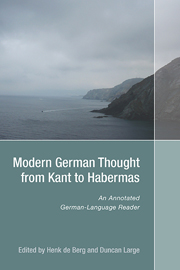Book contents
- Frontmatter
- Contents
- Acknowledgments
- Introduction: German Thought since Kant
- 1 Immanuel Kant (1724–1804)
- 2 Georg Wilhelm Friedrich Hegel (1770–1831)
- 3 Ludwig Feuerbach (1804–72)
- 4 Arthur Schopenhauer (1788–1860)
- 5 Karl Marx (1818–83)
- 6 Friedrich Nietzsche (1844–1900)
- 7 Sigmund Freud (1856–1939)
- 8 Martin Heidegger (1889–1976)
- 9 Walter Benjamin (1892–1940)
- 10 Georg Lukács (1885–1971)
- 11 Max Horkheimer (1895–1973) and Theodor W. Adorno (1903–69)
- 12 Jürgen Habermas (b. 1929)
- Index
- About the Editors
6 - Friedrich Nietzsche (1844–1900)
Published online by Cambridge University Press: 05 September 2014
- Frontmatter
- Contents
- Acknowledgments
- Introduction: German Thought since Kant
- 1 Immanuel Kant (1724–1804)
- 2 Georg Wilhelm Friedrich Hegel (1770–1831)
- 3 Ludwig Feuerbach (1804–72)
- 4 Arthur Schopenhauer (1788–1860)
- 5 Karl Marx (1818–83)
- 6 Friedrich Nietzsche (1844–1900)
- 7 Sigmund Freud (1856–1939)
- 8 Martin Heidegger (1889–1976)
- 9 Walter Benjamin (1892–1940)
- 10 Georg Lukács (1885–1971)
- 11 Max Horkheimer (1895–1973) and Theodor W. Adorno (1903–69)
- 12 Jürgen Habermas (b. 1929)
- Index
- About the Editors
Summary
Life and Work
Friedrich Wilhelm Nietzsche was born in the village of Röcken, Saxony, on 15 October 1844. His father and both grandfathers were Protestant clergymen, so the family naturally expected him to follow in this tradition when, after attending primary school in Naumburg, in 1858 he took up a place at the prestigious boarding school of Schulpforta nearby. Here, he excelled at the classics, which he went on to study at the universities of Bonn (1864) and Leipzig (1865–69), by which stage he had abandoned his religious faith. As a student he fell under the influence of the philosophy of Arthur Schopenhauer (after discovering Die Welt als Wille und Vorstellung in 1865) and the ideas, music, and personality of the composer Richard Wagner, whom he first met in 1868. He would wrestle with their work for the remainder of his career.
Nietzsche's academic distinction was such that, on the recommendation of his supervisor Friedrich Wilhelm Ritschl, he was appointed Professor of Classical Philology at the University of Basel at the precocious age of 24 without even having completed his doctorate. He took up the post in the autumn of 1869. Upon his appointment, he renounced his Prussian citizenship, but he was nevertheless patriotic enough to volunteer for the Prussian army the following year, so as to fight in the Franco-Prussian War. His extremely poor eyesight confined him to service as a medical orderly. After a few weeks, he contracted diphtheria and dysentery at the front and was discharged. Poor health of one kind or another, especially migraine attacks, would dog him for the rest of his life.
- Type
- Chapter
- Information
- Modern German Thought from Kant to HabermasAn Annotated German-Language Reader, pp. 159 - 184Publisher: Boydell & BrewerPrint publication year: 2012



